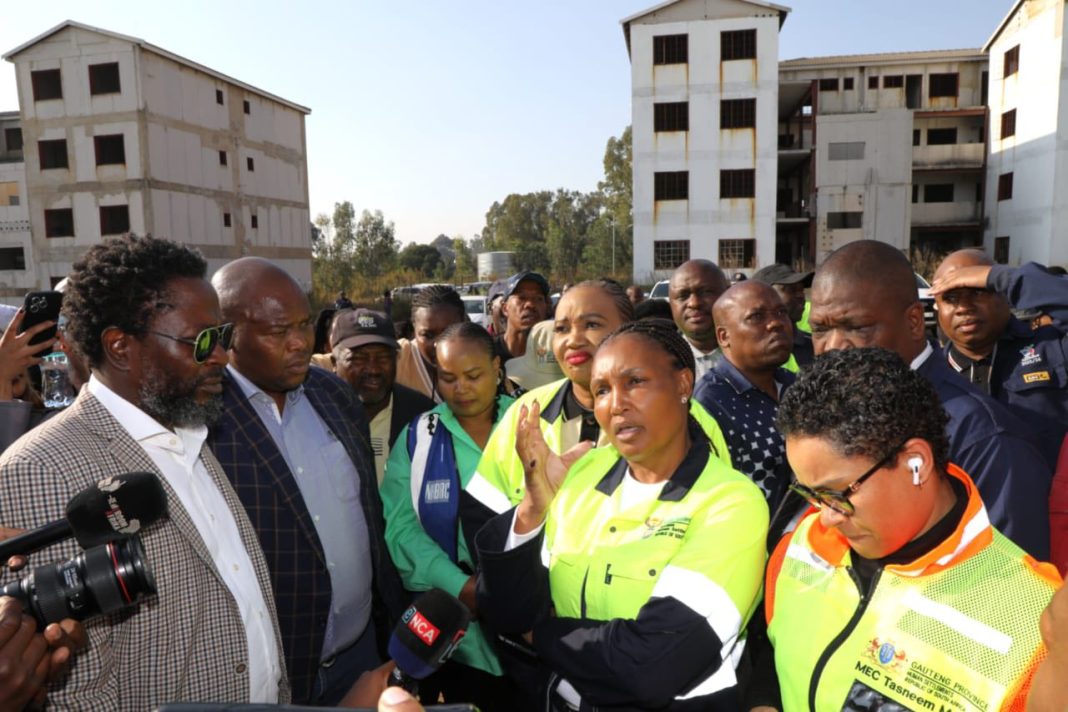By Johnathan Paoli
Minister of Human Settlements, Thembi Simelane, on Tuesday visited the long-abandoned Tembisa Extension 25 Mega Housing Project, which has been stalled since 2017 due to persistent challenges including vandalism and the takeover of the site by construction mafias.
During her visit, Simelane reiterated the government’s commitment to reviving the R400 million project.
“The growth of informal settlements and backyard dwellings reflects the vast number of people still in need of housing. That’s why we want to complete this project and hand it over to the residents,” Simelane said.
“We can’t give a definite timeline yet, but I’m hopeful that within the next 14 days, we’ll have a clear plan of action.”
Earlier this year, the minister announced that the department would prioritise completion of 271 blocked housing projects and nine distressed social housing developments, particularly in KwaZulu-Natal, Free State, North West, and Gauteng—where about 40 projects remain stalled.
Simelane was accompanied by Deputy Minister Tandi Mahambehlala, Gauteng Human Settlements MEC Tasneem Motara, and Ekurhuleni Executive Mayor Nkosindiphile Xhakaza.
Prior to the oversight visit, the delegation engaged stakeholders at the Eric Molobi Innovation Hub.
At the Innovation Hub, Simelane stressed the need to explore and implement alternative building technologies (ABTs) to fast-track delivery and reduce costs – especially in disaster-prone areas.
Joined by leadership from the National Home Builders Registration Council (NHBRC), she inspected innovative housing systems offering quicker, cost-effective, and sustainable construction alternatives.
“The traditional brick-and-mortar approach is increasingly unsustainable due to rising costs and frequent natural disasters. We must shorten the housing value chain and reduce reliance on costly temporary shelters in disaster response,” Simelane said.
She also stressed the importance of community engagement, saying residents must be fully informed and confident in the adoption of new building technologies.
During a media briefing, Simelane and senior officials addressed the project’s prolonged delays.
She confirmed the development had been blocked since 2022, citing structural vandalism, mismanagement, and non-payment of subcontractors as key issues.
Frustrated beneficiaries, many of whom have waited years, were initially promised occupation by June 2021.
Simelane also confirmed that structural integrity tests are currently underway at the stalled Tembisa Extension 25 Mega Housing Project.
A report from the National Home Builders Registration Council (NHBRC), due within two weeks, will guide budgeting and reconstruction plans.
Simelane said accountability processes are in motion: officials who failed in their oversight duties have been removed, civil action is being pursued, and criminal investigations are pending.
Ekurhuleni executive mayor Nkosindiphile Xhakaza confirmed that the City has allocated R87 million for the construction of top structures and R300 million for water and sanitation infrastructure.
A project turnaround is expected to begin by 1 July.
Gauteng MEC for Human Settlements, Tasneem Motara, highlighted the scale of the provincial housing crisis, with over 1.3 million people on the waiting list and only 400,000 applications approved due to budget limitations.
She stressed the need for economic growth to enhance housing delivery capacity.
Simelane reiterated that despite years of mismanagement and delays, government remains committed to completing the units and handing them over to beneficiaries.
“This is not just an Ekurhuleni issue; it reflects a national challenge in project planning and delivery,” she said.
“We are intensifying efforts to strengthen oversight, explore alternative building technologies, and fast-track implementation to meet growing demand.”
The R371 million housing project, once envisioned as a flagship development delivering over 3,500 social housing units, has instead become a symbol of dysfunction.
The site has been marred by financial mismanagement, illegal occupation, and hijackings by construction mafias, turning a once-hopeful initiative into a humanitarian crisis.
The collapse of contract enforcement and weak dispute resolution mechanisms have contributed to cascading delays, not just in Tembisa, but across several other mega-projects including Daggafontein, Leewpoort, and Vosloorus.
Opposition parties such as the Freedom Front Plus and ActionSA have condemned the city’s failures, calling the Tembisa situation a glaring example of a systemic breakdown in governance, planning, and service delivery.
INSIDE METROS

